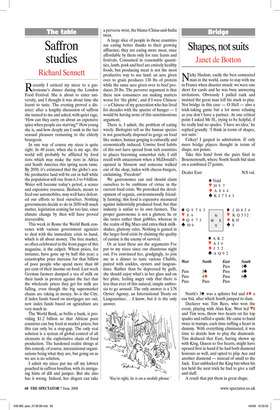Saffron studies
Richard Sennett
Recently I enticed my niece to a gastronome’s dinner during the London Food Festival. She is about to enter university, and I thought it was about time she learnt to taste. The evening proved a disaster; after a lengthy discussion of saffron she turned to me and asked, with quiet rage, ‘How can they carry on about an expensive spice when people are starving?’ How young she is, and how deeply am I sunk in the last sensual pleasure remaining to the elderly bourgeois.
In one way of course my niece is quite right. In 40 years, when she is my age, the world will probably be afflicted by food riots which may make the riots in Africa and South America this spring seem tame. By 2050, it’s estimated that the globe’s arable productive land will be cut in half while the population will rise from 6.3 to 9 billion. Water will become today’s petrol, a scarce and expensive resource. Biofuels, meant to feed our automobiles, may well have defeated our efforts to feed ourselves. Nothing governments decide to do in 2050 will much matter, legislation coming far too late, since climate change by then will have proved irreversible.
This week in Rome the World Bank convenes with various government agencies to deal with the immediate crisis to hand, which is all about money. The free market, so often celebrated in the front pages of this magazine, is the culprit. Wheat prices, for instance, have gone up by half this year; a catastrophic price increase for that billion of poor people who spend more than 60 per cent of their income on food. Last week German farmers dumped a sea of milk on their lands in protest against the fact that the wholesale prices they get for milk are falling, even though the big supermarket chains are raking in money. So is the City; if index funds based on mortgages are out, new index funds based on agriculture are very much in.
The World Bank, as befits a bank, is providing $1.2 billion so that African poor countries can buy food at market prices, but this can only be a stop-gap. The only real solution is a system of global control of all elements in the exploitative chain of food production. The hardened realist shrugs at this remedy, of course, international organisations being what they are, but going on as we are is no solution.
I admit my niece put me off my lobster poached in saffron bouillon, with its intriguing hints of dill and juniper. But she also has it wrong. Indeed, her disgust can take a perverse twist, the blame-China-and-India twist.
A large slice of people in those countries are eating better thanks to their growing affluence; they are eating more meat, once affordable by them only for rare feasts and festivals. Consumed in reasonable quantities, lamb, pork and beef are entirely healthy foods, but producing meat is not the most productive way to use land: an acre given over to grain produces 138 lbs of protein while the same acre given over to beef produces 20 lbs. The perverse argument is that these new consumers are making matters worse for ‘the globe’, and if I were Chinese — a Chinese of my generation who has lived for decades with the spectre of hunger — I would be having none of this sanctimonious argument.
There is, I admit, the problem of eating wisely. Biologists tell us the human species is not genetically disposed to gorge on food like snakes; human gorging is culturally and economically induced. Unwise food habits of this sort have spread from rich countries to places becoming somewhat rich; I still recall with amazement when a McDonald’s opened in Moscow and someone walked out of the shop, laden with cheese-burgers, exclaiming, ‘Freedom!’ We gastronomes can and should claim ourselves to be emblems of virtue in the current food crisis. We provoked the development of organic, environmentally friendly farming; this food is expensive measured against industrially produced food, but that industry is unfair to its own farmers. The proper gastronome is not a glutton; he or she tastes rather than gobbles, whereas in the realm of Big Macs and extra-thick milkshakes, gluttony rules. Nothing is gained in the larger food crisis by claiming the quality of cuisine is the enemy of survival.
Or at least these are the arguments I’ve put to my niece since our disastrous night out. I’ve convinced her, grudgingly, to join me in a dinner to taste various Chablis, paired with cockles, oysters and langoustines. Rather than be depressed by guilt, she should enjoy what’s in her glass and on her plate, feeling angry only that there is less than ever of this natural, simple ambrosia to go around. The only answer is a UN Oyster Agency, an International Treaty on Langoustines ... I know, but it is the only answer.










































































 Previous page
Previous page